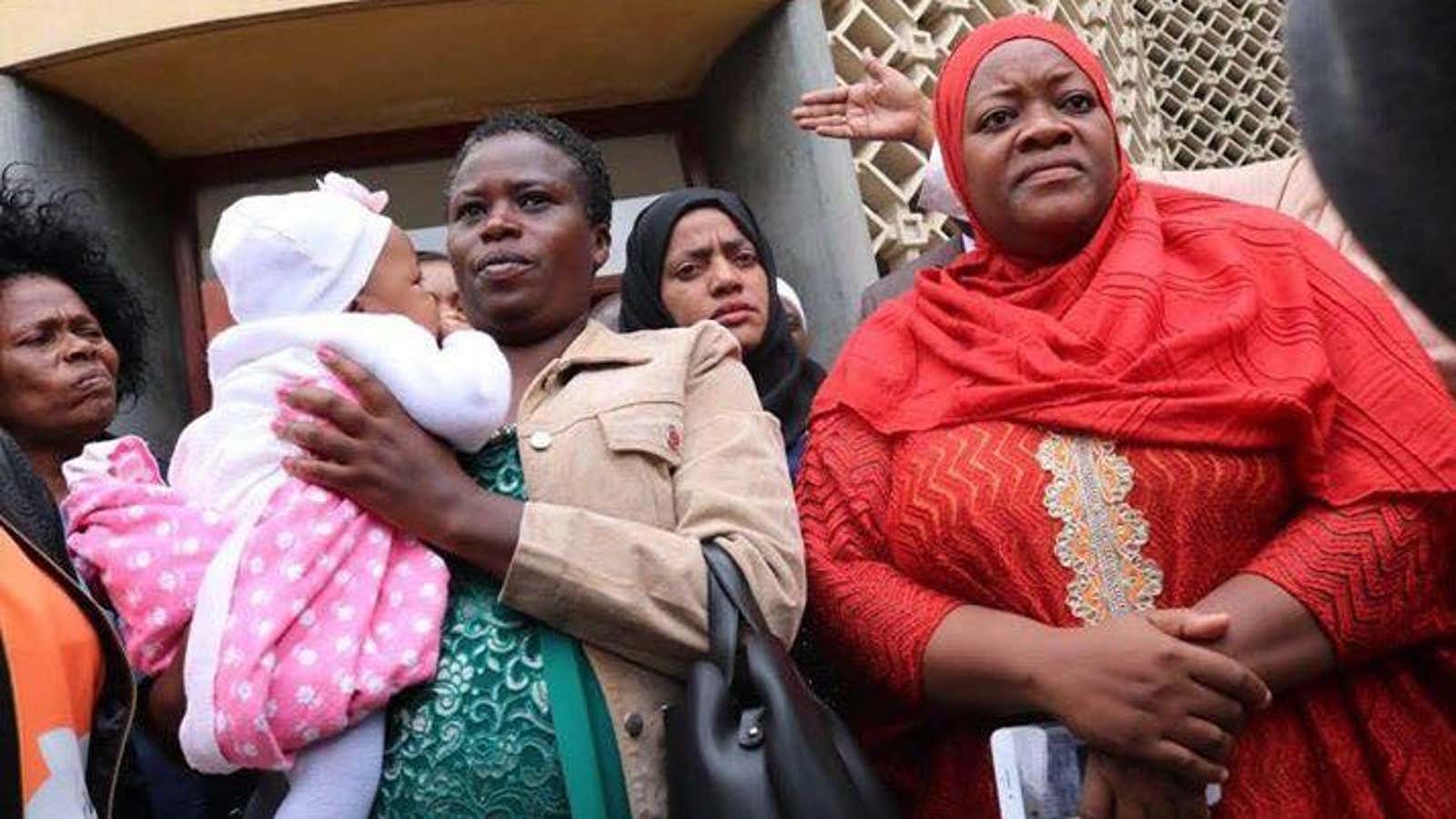When footage circulated last week of a Kenyan lawmaker, Hon. Zuleikha Hassan, being kicked out of parliament for coming in with her baby, reactions across the country were mixed, but mostly muted. A home emergency left the Kwale county women’s representative with no one that she could leave her five-month old baby with.
It’s a conundrum that millions of nursing mothers face daily around the world—a choice between their jobs and taking care of their babies. Hon. Hassan took her baby, Mwanabaraka, with her to work as a bill was being discussed that she felt was important for her constituents.
In the video voices of some male politicians can be heard shouting, “You have to chase her!” Several female lawmakers and a few male ones appeared to come to Hassan’s defense, but eventually she and her baby were forced to leave parliament.
The act, which took place on the last day of world Breastfeeding Week, could not have been more timely. In 2013, Kenyan lawmakers had actually passed a bill requiring Parliament to put aside a room for breastfeeding mothers, but six years later this has not happened. In a parliament that is 76% male, such an oversight is not all that surprising.
The news did not cause a major uproar among Kenyans. This could likely be because of the current political climate where there is no love lost for politicians in general and there is also a major campaign underway to downsize parliament given the high costs to taxpayers.
But it does offer us a moment to reflect on the harsh realities of being a female politician in Kenya and the day to day struggles that they face. This is in addition to having systems that while in theory are meant to be supportive to female leadership, in reality make the playing field extremely uneven.
Kenyan politics is a rough game and especially so for women. According to a well-known and outspoken female MP, Hon. Millie Odhiambo, violence especially in the form of sexual violence (actual or threats) is one of the key ways that women are kept from running for political positions in the country. She says male support is needed to ensure female MPs do not get attacked by supporters of their opponents on the campaign trail. She knows firsthand the realities of needing extra security than her male counterparts. In 2017 one of her bodyguards was killed. Politicians routinely incite their supporters to violence but some of the worst is meted out to female politicians and their supporters.
Another key way women are discouraged from joining politics is the constant policing of their morality. Freud’s Madonna-Whore complex is alive and very well in Kenya. Once a woman enters the political sphere, the first thing detractors do is to label her a bad woman and it becomes a strange justification for the injustices that are done against such women.
This would explain why when in 2013, the then Nairobi governor, Evans Kidero, was caught on film publicly slapping the then Nairobi county’s women representative Racheal Shebesh, a lot of the discussions online were about how she deserved to be put in her place as she had been labeled a rebellious woman. More sympathy was reserved for her husband with comments stating, “How can he slap someone else’s wife?” as in the patriarchal system, the real injustice done was to her husband who she belongs to.
In the Kenyan psyche, the worst way to be a bad woman is tied to your sexuality. This is the jugular that detractors first cut. Kingwa Kamencu, who in 2013 became Kenya’s youngest female presidential aspirant, says the “smear campaigns” begin as soon as a woman decides to run for political office. “For women, the easiest way they can do that is by making discussions public about your real or imagined sex life. They will first say you are a prostitute. If you are married, they will say you are promiscuous. If you are single, they will say you are unmarriageable. For many women, the fear of having to be discussed in such ways publicly is enough of a deterrent.”
After her failed presidential bid, Kamencu came to the realization that, “Goodwomanness will not save you. For women to get power in politics, they cannot perform goodwomanness.” She says women entering this male-dominated space are expected to be grateful for having been let in and somehow make themselves small and compliant.
Kamecu’s idea is these women will supposedly be rewarded for their goodwomanness maybe with fair treatment, more support for female politicians etc. Quite soon they realize that no matter what they do, they will still be harassed, shamed, intimidated and belittled with rumors about their sex lives being fodder for public debate on their suitability to lead.
The path to equality in political representation in Kenya is going to be a long one. And for now, Parliament seems to have been shamed into starting work on a creche, but for the millions of women in the country who might one day aspire to be political leaders, theirs will continue to be an uphill battle. Kenya’s female leaders are however up for the fight.
Sign up to the Quartz Africa Weekly Brief here for news and analysis on African business, tech and innovation in your inbox
